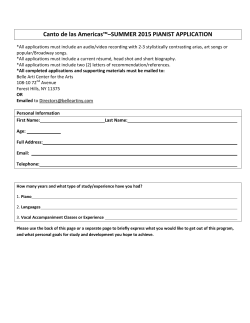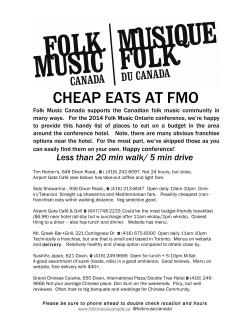
One Sheet
303.495.0989 WWW.JAYMESTONE.COM JAYME@JAYMESTONE.COM JAYM E STONE’S LOM AX PROJECT Focusing on songs collected by folklorist and field recording pioneer Alan Lomax, this collaboratory brings together some of North America's most distinctive and creative roots musicians to recycle, re-imagine and recast traditional music. The repertoire includes Bahamian sea chanties, African-American acappella singing from the Georgia Sea Islands, ancient Appalachian ballads, fiddle tunes and work songs collected from both well-known musicians and everyday folk: sea captains, cowhands, fishermen, homemakers, prisoners and farmers. The project has transformed performing arts centers (Colorado Chautauqua, The Strathmore), universities (Tufts, East Tennessee State), and festivals (Vancouver Folk, Rockygrass, Celtic Connections) into creative hubs where eminent musicians gather to re-imagine their roots, create new music and share their collective cultural heritage with diverse audiences. Collaborators include Tim O’Brien, Bruce Molsky, Moira Smiley, Margaret Glaspy, Brittany Haas, Eli West, Julian Lage, and more. A recording of nineteen songs with extensive liner notes is out now on Borealis Records. “Folk music is like our national parks. It belongs to everybody.” — Tim O’Brien This project is a collaboratory: a community of like-minded musicians brought together to seek understudied sounds, dust off old songs and renew them. The aim is to create a process that taps each of our musical trees, harnesses the unexpected chemistry of collaboration and makes music that’s informed by tradition but not bound by it. Through the project’s community outreach and educational programming, audiences will be inspired by the depth, diversity, humanity and history contained in these musical traditions and experience first-hand how music can build a bridge to other cultures and make inroads to their own. EDUCATION AND OUTREACH The Lomax archive provides an outstanding opportunity to explore diverse cultural traditions. Music that is close-to-home will serve to connect participants with their own heritage, history, lore and ancestry, while traditions from afar will help participants open to new sounds and stories from other corners of the globe. Through music, we hope to embody the values of diversity, participation, respect for others and the power of creative expression. In the words of Memphis bluesman Willie B: “Just like a cotton gin takes two, three wagonloads of cotton and squeezes it down to just one bale so you can ship it were you want to go, this microphone squeezes me and my song down into that little wavery line and they can ship me out to wheresomever they want me to sing. See the mystery?” Participants will be encouraged to sing, move and discover the richness of traditional music. We will facilitate group discussion about musical styles, origins of the repertoire and song themes. We will engage our creative process by using Lomax’s field recording archive to discover, repurpose and re-imagine the music of our elders. Through this process, we will work with the vital question of how to honor our heritage while discovering our own voices and worldviews. “Folk melodies are the embodiment of an artistic perfection of the highest order; in fact, they are models of the way in which a musical idea can be expressed with utmost perfection in terms of brevity of form and simplicity of means.” — Béla Bartók RESIDENCY OPTIONS Collaboratory [1 - 3 days] Musicians gather to explore material from the Library of Congress’ American Folklife Center, the Association for Cultural Equity’s online “Global Jukebox” and field recordings that have been commercially released throughout Lomax’s 60+ year of collecting. Musicians will search for source material from a wide spectrum of folk music, African-American jazz and blues, as well as the primary sources of these traditions from West Africa, Western Europe and diasporic cultures in the Caribbean and South America. Musicians will learn songs, transcribe lyrics and melodies from the field recordings, create fresh arrangements of traditional repertoire and compose original songs inspired by their discoveries. Youth W orkshop [1–2 hours] Young audiences will be introduced to folk instruments; experience different performance practices; sing, dance and clap in community; learn about traditional repertoire from the Lomax archives; discover the African roots of the banjo; explore African-American cultural traditions and hear world-class music performed live. This program is designed for K-12 schools. Public W orkshop [1–2 hours] This outreach program is for a general audience and will include a presentation, discussion, performance and Q & A session. This program is appropriate for all ages with no musical experience necessary and is well-suited for libraries, high schools, colleges and festivals. University Academic Programs [½–2 days] An in-depth program will be designed to suit the curriculum of ethnomusicology, folklore or American studies departments. Programs include lectures, audio and video presentations, facilitated discussion, musical participation and performance. We aim to bring the history, stories and traditions that underpin the music alive through creativity and collaboration. University Music Programs [1–4 days] In addition to the program content outlined above, we offer specific sessions for music students, including workshops, masterclasses, guided ensembles and small group lessons. We encourage students to participate in the “folk process” with us. That is, we share original field recordings with them, explore their history and then choose compelling material to rework, recast and re- imagine together. We’ll use the tools and techniques of music – melodic and harmonic development, rhythmic play, lyric-writing, instrumentation, form, timbre – to create contemporary arrangements that are formed and informed by the traditions captured on dusty old recordings. Concerts [matinee or evening] Concert programs feature our touring repertoire, new music developed in the Collaboratory program and songs that highlight all the artists involved. THE LOM AX LEGACY “Alan Lomax was a folklorist, ethnomusicologist, archivist, writer, scholar, political activist, oral historian, and film-maker. Lomax is most famous for his work in the penitentiaries, plantations, and lonely farms of the Mississippi Delta, where he returned no less than seven times between 1933 and 1985 to listen, observe, fraternize, and record night after night, year after year; but he repeated this feat with astounding results in hundreds of obscure places in the U.S., the Caribbean, Europe, and North Africa. Jelly Roll Morton, Woody Guthrie, Lead Belly, Muddy Waters, and the Reverend Gary Davis were only a few of the many geniuses, famous and obscure, who were in reality telling us the true story of our country over Alan’s microphone. The sympathy, connoisseurship, and technical avant-gardism he poured into his work in every platform — from the interview to the printed page, concert stage, commercial disc, and scholarly article — yielded some of the most passionate and intimate documents of any era, which might have been lost but instead led to the ecumenical vision of the world’s music we have today. But more than this, what Alan Lomax had in mind was the renewal of the forgotten springs of human creativity.” — Anna Lom ax W ood
© Copyright 2025










